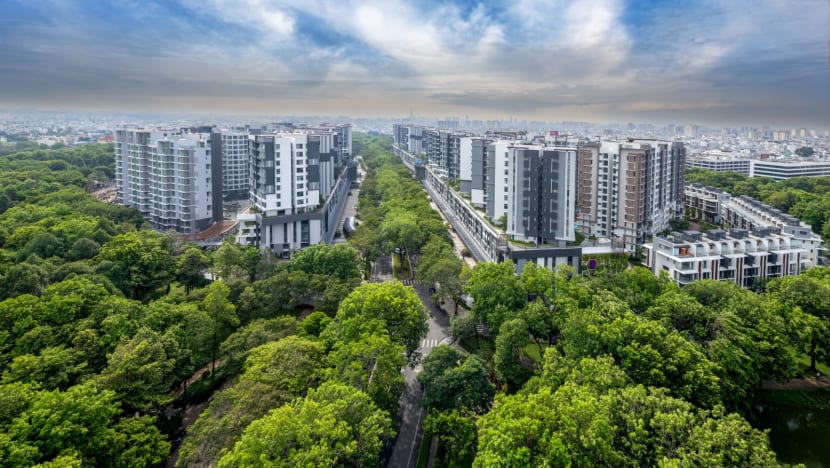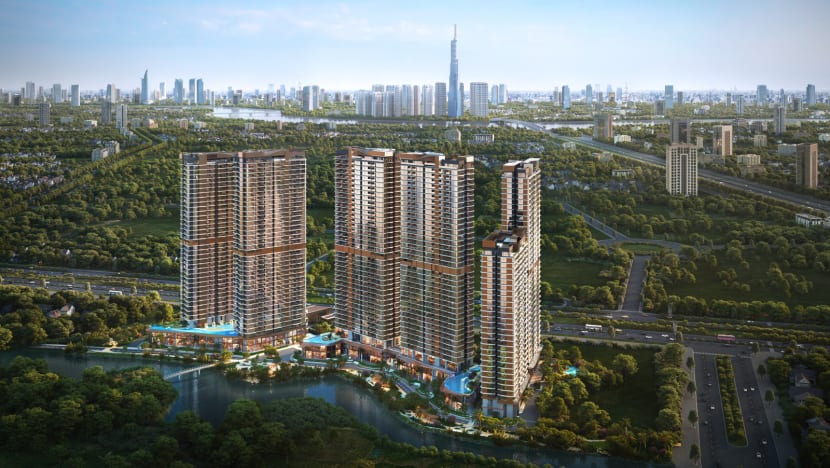Capitalising on Vietnam’s growth: Gamuda Land’s expansion in Southeast Asia’s fastest-growing economy
The regional property developer is transforming the country’s real estate landscape with large-scale projects that meet the needs of a rising middle class seeking well-planned communities.

Celadon City, a township in Ho Chi Minh City, features 6,600 homes with a gross development value of US$1 billion (S$1.37 billion). Photos and artist’s impressions: Gamuda Land

This audio is generated by an AI tool.
Over the past decade, Southeast Asian economies have made steady strides, with Vietnam emerging as a standout performer. Achieving an impressive gross domestic product (GDP) growth rate of 7.1 per cent last year, the country is poised to sustain this momentum, driven by robust foreign direct investment, a thriving manufacturing sector and increasing domestic consumption.
“Rising incomes and an expanding middle class are fuelling domestic consumer spending,” said Mr Troy Griffiths, deputy managing director of real estate firm Savills Vietnam. “Vietnam’s major cities are rich in employment opportunities that, in turn, have accelerated rapid urbanisation in both the north and the south.”
Urbanisation has significantly influenced preferences for residential and mixed-use developments. Playing an integral role in Vietnam’s real estate transformation is Gamuda Land, a regional property developer contributing to the nation’s urban development.
PIONEERING URBAN DEVELOPMENT

With foreign direct investment boosting the real estate sector, the market presents growth opportunities for developers with a long-term vision.
The Vietnamese government has also prioritised infrastructure development to enhance connectivity between provinces and key cities. Major projects like the newly opened Ho Chi Minh City metro and Hanoi’s Ring Road No 4 are driving urban expansion and helping to ease population density in congested city centres, further enhancing the appeal of property investments in these hubs.
Recognising its potential early on, Gamuda Land entered Vietnam in 2007 with its flagship Gamuda City, one of the country’s largest urban developments, spanning 274ha.
Since then, Gamuda Land has completed Celadon City in Ho Chi Minh City, an 82ha township near Tan Son Nhat Airport featuring 6,600 homes with a gross development value (GDV) of US$1 billion (S$1.37 billion). Chosen for its accessibility and proximity to key business and transport hubs, Celadon City underscores Gamuda Land’s ability to identify high-potential locations and transform them into thriving communities.
The economic impact of Gamuda Land’s developments has been significant. In Celadon City, for instance, land prices have surged in response to long-term planning and infrastructure investments. On Vuon Lai Street, prices have climbed from US$1,172 per sqm in 2016 to around US$1,562 today, while small plots have doubled in value.
Beyond real estate, Gamuda Land’s developments have generated substantial economic spillover effects that benefit local communities. Celadon City alone has created over 10,000 jobs across sectors such as construction, services, education and retail. The township has also strengthened education infrastructure, with five schools now serving up to 10,000 students. These efforts have not only enhanced residents’ quality of life but also fostered a strong sense of belonging and boosted property values.
Building on this success, Gamuda Land has since developed several large projects in Vietnam, including Eaton Park, a luxury mixed-use development in Ho Chi Minh City’s Thu Duc City. Located across the Saigon River in District 2 – a 10-minute drive from the bustling central business district – this sprawling estate boasts a “city within a city” model designed to enhance urban planning. Within eight months of its early 2024 launch, the project surpassed a GDV of US$450 million, underscoring strong market demand.
TARGETED EXPANSION THROUGH QUICK TURNAROUND PROJECTS

Gamuda Land’s regionalisation strategy is built on a balanced approach that enables sustainable global scaling, delivering higher returns for shareholders while diversifying geographical risks. “By prioritising high-yield projects with strong internal rates of return alongside our township developments, we can generate returns within five years and reinvest in new ventures,” said Mr Angus Liew, chairman of Gamuda Land Vietnam.
Leveraging its strong track record and Vietnam’s growing market potential, Gamuda Land recently acquired a 1.1ha parcel in Haiphong, the country’s third-largest city, for US$38.9 million. The site, located in the Le Chan district – just 1.5 hours from Hanoi, 2km from Haiphong’s central business district, and near Cat Bi International Airport – benefits from excellent infrastructure and proximity to government agencies, malls, universities and hospitals.
Haiphong’s residential market is rapidly expanding, with strong growth potential reflected in its total apartment stock of 13,087 units across five active and eight sold-out projects as of the first half of 2024. Between 2019 and 2023, stock grew at 28 per cent per year, seeing an addition of about 2,000 units annually. Among the city’s six districts, Le Chan held the largest share at 42 per cent, highlighting its potential as a key growth area. With limited supply in Haiphong’s city centre, Le Chan offers a strategic opportunity with less competition from new developments.
DRIVING GROWTH THROUGH STRATEGIC INVESTMENTS
Over the next five years, Gamuda Land plans to invest US$2.4 billion globally, aiming for a balanced sales contribution of 40 per cent from Malaysia, 45 per cent from Vietnam and 15 per cent from the United Kingdom, Australia and other markets by 2030.
Capitalising on Vietnam’s strong economic growth, the company has earmarked an additional US$1.6 billion for further developments in the country over the next five years. This brings Gamuda Land’s cumulative investment in Vietnam to US$4.2 billion, covering both property and infrastructure development. The company also anticipates that Vietnam will account for 60 per cent of its international sales (excluding Malaysia) during this period.
“We are optimistic about Vietnam’s potential and remain dedicated to delivering long-term value in its flourishing real estate landscape,” said Mr Liew.
Find out more about investment opportunities in Vietnam with Gamuda Land.















